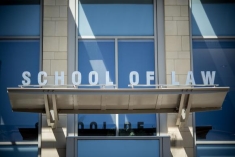Legal Action Launched Over Expungement Delays in New Jersey

The New Jersey Office of the Public Defender (OPD) announced today that it filed a class action lawsuit against the New Jersey State Police (NJSP) to require it to timely process expungement orders. The suit is the result of the collaborative efforts of Rutgers Law School’s Expungement Law Project (ELP) in Camden, OPD, ACLU-NJ, Volunteer Lawyers for Justice (VLJ), and Legal Services of New Jersey. Rutgers Law Professor and ELP Director Meredith Schalick convened this group of stakeholders over the past year to discuss concerns about the criminal expungement process in New Jersey. Sandra Simkins, Rutgers Law professor, and Dr. Sarah Lageson, Rutgers School of Criminal Justice associate professor in Newark, also lent their expertise to the group.
In trying to address the expungement process delays caused by NJSP, the group made an Open Public Records Request, spoke with and emailed leaders in NJSP, NJ Office of the Attorney General and NJ Administrative Office of the Courts, and even made a referral to the NJ Office of the State Comptroller, led by Rutgers Law alumnus Kevin Walsh ’99. However, it became increasingly clear to the group that litigation was likely to be the only way to force a spotlight on the unreasonable delays and get relief for nearly 50,000 people waiting for the NJSP to comply with criminal expungement orders.
New Jersey has been on the forefront of expanding opportunities for people to expunge their criminal records, and the courts have ordered the records of thousands of New Jerseyans expunged. Once an expungement is granted, the NJSP is charged with removing such offenses from publicly available records. But the NJSP’s extreme delays in processing expungement orders and sealing individuals’ criminal records is frustrating the law’s goals of allowing reformed and rehabilitated New Jerseyans to be freed from the collateral consequences of their past lives.
In 2019, the State Police received access to $15 million in taxpayer money to support swift processing of expungement orders. However, the agency has a significant backlog of unprocessed orders, recently estimated to consist of almost 50,000 cases. Individuals have waited many months, even over a year, for the State Police to process their expungement orders. This means that potential employers and other organizations that run background checks can learn about a person’s criminal history in contravention of the court orders expunging those records. This impacts their ability to obtain employment, housing, licenses, and other opportunities.
Through ELP, low-income New Jersey residents can get help to navigate the cumbersome expungement process and clear their records, providing an opportunity for them to restart their lives as equal citizens in society. Since ELP began in spring 2018, law students have assisted well over 300 people looking to expunge their records.
Professor Schalick said, “During that time, we have watched the New Jersey State Police go from taking about four months to comply with an expungement order and delete the necessary data, to now taking almost two years to comply with orders.” She added, “New Jersey can do better for people seeking a second chance, and the New Jersey State Police should be held accountable for failing to do their job.”
According to the lawsuit, a court expunged Plaintiff A.A.’s offenses in December of 2021. He has been waiting since then for them to be removed from his record. During the almost two-year delay, he has been turned away from multiple community volunteer positions to coach his son’s youth sports teams after the NJSP revealed his expunged criminal history in response to background checks. Plaintiff C.C., whose expungement order was issued in September 2022, had her expunged criminal history disclosed in September 2023 when she applied for a massage therapy license. A six-month delay in processing B.B.’s expungement order cost him a job at a casino. The other Plaintiffs named in the Complaint—D.D., E.E., and F.F.—have experienced similar delays that have prevented them from obtaining jobs and licenses.
The Plaintiffs, and other class members, have worked hard to reform themselves, overcoming poverty, addiction, and other past trauma, but find themselves unable to move forward with their lives due to the State Police’s failure to process their expungement orders in a timely manner.
The delay also has devastating consequences for those waiting for expungement under New Jersey’s vacatur law, which allows victims of human trafficking to move to vacate and expunge any criminal charges if they can show that, at the time of the offense, it was a result of their trafficked status.
“To add insult to injury, there is no way to even know when an expungement order is complied with since the NJ State Police no longer issues confirmation letters, and the Administrative Office of the Courts removed the notification feature in e-courts,” said Karen Robinson, managing attorney of Volunteer Lawyers for Justice.
Media mentions: NJ Spotlight News | Asbury Park Press | New Jersey Monitor | Reason.com